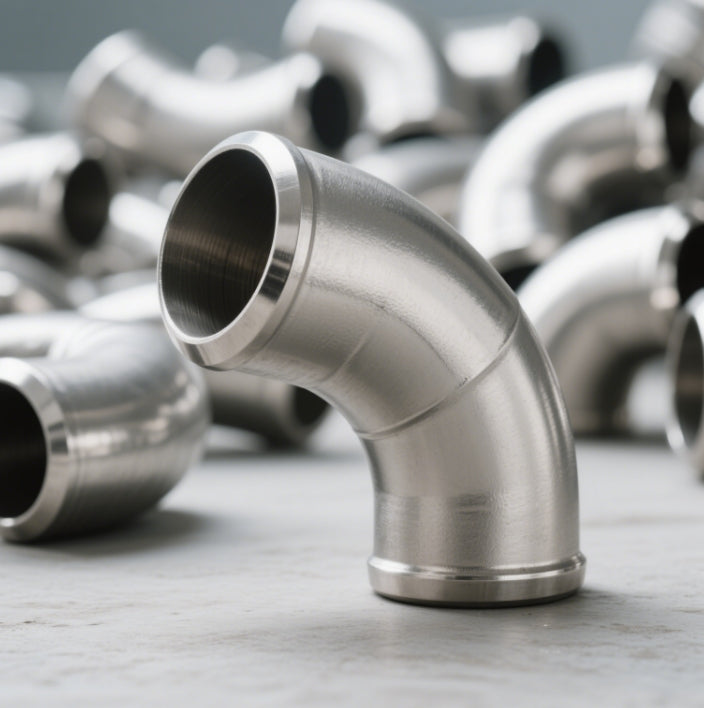StockSteel
Long-Lasting Stainless Steel 90 Degree Elbow | Butt Weld Precision
Long-Lasting Stainless Steel 90 Degree Elbow | Butt Weld Precision
Couldn't load pickup availability
Long-Lasting Stainless Steel 90 Degree Elbow | Butt Weld Precision
Product Specifications
| Property | Stainless Steel 90 Degree Elbow | Standards Compliance |
|---|---|---|
| Material Grades | 304, 316L, 321, Duplex 2205 | ASME B16.9, DIN 2605, EN 10253 |
| Size Range | ½"–24" (DN15–DN600) | SCH5S–SCH160 |
| Wall Thickness | 1.5–40 mm | ANSI B16.11, MSS SP-43 |
| Surface Finish | Mirror Polished, Pickled, Sandblasted | Ra 0.4–0.8 μm (hygienic) |
| Hardness (HV) | ≤200 HBW | ASTM A403, ISO 9001 |
| Pressure Rating | 150–3000 PSI | NACE MR-0175 (corrosion-resistant) |
| Operating Temp | -196°C to 900°C | FDA, 3A Sanitary Compliance |
Mechanical Properties
Tensile Strength
Our stainless steel 90 degree elbow delivers a minimum tensile strength of 520–620 MPa (304/316L grades), ensuring robust performance in high-pressure systems like oil pipelines and chemical processing. The austenitic microstructure, enhanced by molybdenum in 316L, resists stress corrosion cracking even in chloride-rich environments such as marine applications.
Bending Strength
With ≥35–40% elongation, these elbows withstand cold-forming processes like hydroforming and mandrel bending. The stainless steel street elbow maintains structural integrity under repetitive stress, ideal for HVAC systems and food-grade pipelines requiring smooth directional changes.
Identification & Marking
- Standard Markings: Laser-etched with grade (e.g., 304/316L), size, pressure rating, and heat number.
- Certifications: ASME B16.9, ISO 9001, and PED 97/23/EC for traceability.
- Surface Codes: Polishing grades (180–420 grit) indicated for hygienic applications.
Weight Calculation
Weight (kg) = [(OD – WT) × WT × OD × 0.02491] × 1.5 (90° factor)
Example: A 219mm OD × 3.76mm WT 6 inch stainless steel stove pipe elbow weighs 10.15 kg (304L).
Why Stainless Steel Corrodes?
Despite its corrosion resistance, stainless steel elbows may rust under extreme conditions:
- Chloride Exposure: Seawater or de-icing salts penetrate the chromium oxide layer, causing pitting.
- Intergranular Corrosion: Prolonged 450–850°C exposure forms chromium-depleted zones at grain boundaries.
- Galvanic Corrosion: Contact with dissimilar metals (e.g., carbon steel) in humid environments accelerates degradation.
- Mechanical Damage: Abrasive handling or improper welding compromises surface integrity.
Key Features & Applications
Material Advantages
- Hygienic Design: Mirror-polished stainless steel 45 degree elbow configurations meet FDA and 3A standards for dairy and pharmaceutical industries.
- Temperature Resistance: Stable performance in cryogenic LNG systems (-196°C) and high-temperature exhausts (900°C).
- Customization: Available in stainless steel street elbow designs for tight spaces or specialized plumbing.
Processing Techniques
| Process | Description |
|---|---|
| Mandrel Forming | Maintains uniform wall thickness for high-pressure integrity. |
| Solution Annealing | Restores corrosion resistance post-welding (1050–1100°C). |
| Electropolishing | Reduces surface roughness to Ra <0.4 μm for sanitary compliance. |
Why Choose Our Stainless Steel Elbows?
- Certified Excellence: ASME B16.9, ISO 9001, and 3A Sanitary certifications ensure reliability.
- Global Supply: 10,000+ pieces/month capacity with rapid delivery from China, India, and EU hubs.
- Custom Solutions: Tailored dimensions, angles (45°–180°), and threading (NPT, BSPT).
- Technical Support: 24/7 engineering guidance on welding, pressure testing, and corrosion prevention.
- Sustainability: 100% recyclable with RoHS-compliant production.

